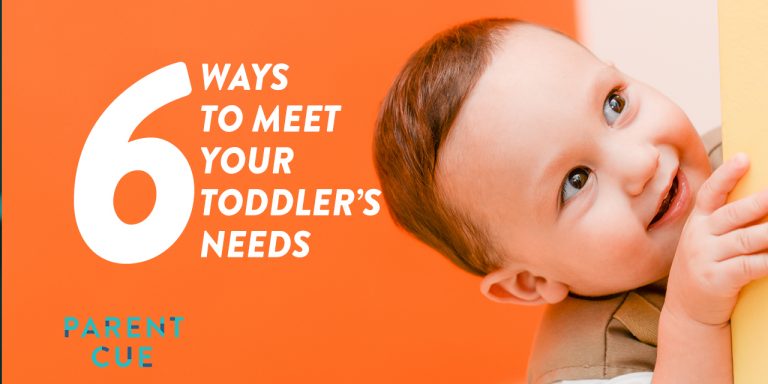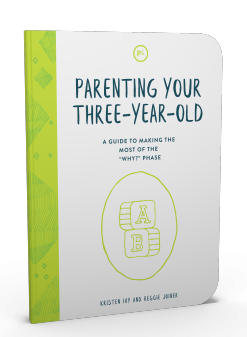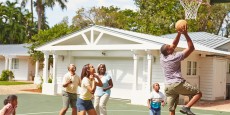
Toddlers get a bad rap. Sure they whine and throw tantrums. But can you blame them? There’s a lot going on in those pint-sized bodies.
By age two, your little one will grow to half their adult height—something they’ll spend the next two decades reaching. And their shape will morph from one designed for doing a whole bunch of nothing to one that can crawl, walk and run.
With the world at their fingertips, there’s still so much they can’t do. That’s where you come in.
Your Toddler’s Physical Needs
Toddlers bring to us four basic physical needs: independence, affection, rest and wide open spaces. Your toddler probably isn’t even aware of these longings. But now you are.
So let’s break it down, shall we?
Independence: They’re living the “do it myself” phase of life. Most things they can’t actually do themselves, but they sure want to try. After all, toddlers learn by doing.
Affection: Nothing matters more to a toddler than your physical, consistent presence.
Rest: Wired as he may be, your toddler needs a break. Naps and room time are like a reset for his mind and body.
Wide open spaces: Play is a deceptive word for all the work a toddler does while climbing a ladder at the park or running laps in your living room. Expending energy and gaining knowledge all while going a wee bit wild is the necessary act of child’s—err, toddler’s—play.
How You Make a Difference
You can help your little one manage the transition to preschooler as long as you accomplish your number one goal: attending to their physical needs.
When you decide to go for it and to take on all the mess and energy that this action requires, a few beautiful things happen. You…
help your toddler develop confidence.
reassure your toddler he is safe with you.
answer your toddler’s big question, “Am I able?” with a resounding, “Yes!”
portray God the Father as you extend patience, love, and grace.
Six Practical Ways to Embrace Your Toddler’s Needs
1. Involve him in your daily activities.
Look for tasks that are challenging but doable and ask your toddler to help. You might bake cookies together, put away groceries or clean up a mess. The opportunity to practice a new skill also allows your toddler to contribute to the family in a meaningful way.
2. Repeat a useful phrase.
Remember how it felt the last time you wanted to do something but your body or brain wouldn’t cooperate? Toddlers live in that moment. Teach him to work through his emotions by repeating a phrase like, “When you’re frustrated what can you do? Try again or ask for help.” Say it over and over. Soon enough he’ll stop you mid-sentence, with a smile even, to say “Okay! I’ll try again!”
3. Offer toys and outings that build his muscles.
We all have ‘em: toys that light up, make noise and require no effort on behalf of our kids. As often as you can, ditch those passive activities in favor of ones that improve gross and fine motor skills. Grab blocks, puzzles or playdough. Take a long walk, visit the park. Set the stage and let him explore.
4. Cuddle on the couch.
Affection is a miracle antidote. It’s also a lovely preventable measure that’s sure to ward off a tantrum or two. Snuggle up on the couch or in bed at least once a day to cuddle, read books, or sing silly songs.
5. Relate to their mistakes.
Toddlers crave approval. And they’re smart enough to know that peeing on the floor isn’t what you’re looking for. Avoid shaming your toddler, which is demotivating and, instead, relate to their struggle. You might say, “It’s okay! Accidents happen.” And then share a story about when you made a mistake.
6. Stick to your guns.
Toddlers are little boogers who insist—quite convincingly—that they can play all day. But you know better. Encourage two naps for toddlers under 18 months of age and one afternoon nap for older toddlers. If he has trouble falling asleep, fill his bed with books and watch him grow a love for reading. Make rest a must in your home.
When all else fails, be an encourager. Affirm effort over outcome with four little words: “You can do it!”
Read more about your toddler in the new Phase Guide Series by Kristen Ivy & Reggie Joiner. It’s just a phase, so don’t miss it.
Parenting Your Three Year Old

Parenting Your Three-Year-Old simplifies what you need to know about three-year-olds in general and gives you a place to discover more about your three-year-old—so you can make the most of this phase.
You catch yourself singing the lyrics to preschool songs—even with no kids around, and you might be in one of the best phases of your child’s life. THIS IS THE PHASE WHEN ANYTHING CAN BE IMAGINED, EVERYTHING CAN BE A GAME, AND ONE CURIOUS PRESCHOOLER WANTS TO KNOW, “WHY?”
Releasing July 18, 2017. Available now for pre-order.
Don’t have a 3-year-old? We’ve got a book for every age at phaseguides.com.
Source: The Parent Cue





